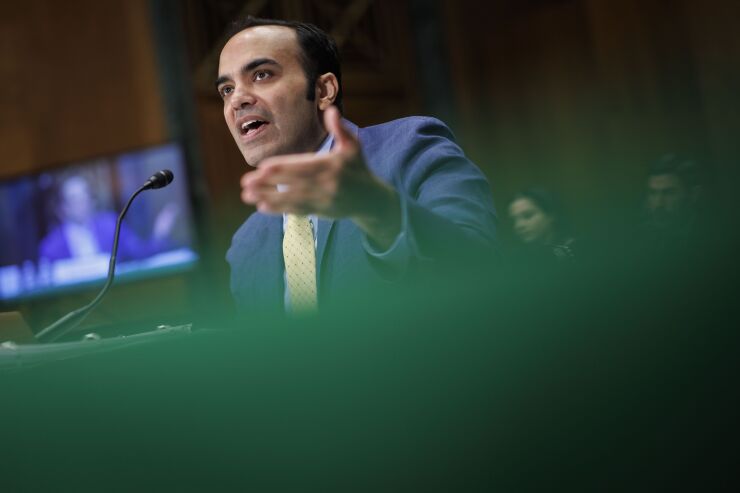
WASHINGTON — The Consumer Financial Protection Bureau is gearing up to publicize repeat offenders of consumer laws, finalizing a database that will track wrongdoing across different states.
The database, which agency officials expect to launch next year, is part of
But the CFPB director told reporters that the database will limit the ability of "fraudsters and scam artists" to resume wrongdoing, since it would easily let consumers track orders across different agencies and courts.
"Too many American families and businesses have been harmed by repeat offenders in a rinse-repeat cycle of illegal activity where bad actors see fines and penalties as just the cost of doing business," Chopra said, likening it to similar databases for lawyers, doctors and other industries.
Payments companies, debt collectors, auto lenders and other nonbank companies will have to report whether they've faced an agency or court order for consumer infractions. The requirement covers orders going back to 2017, and companies must report any new orders or changes to existing ones within 90 days.
Senior executives must also provide a written attestation every year stating that they've submitted all relevant orders.
The registry would have captured trends across different states before the 2008 financial crisis, including state officials' attempts to "stop many of the abuses in the mortgage market," Chopra said. State regulators and law enforcement will benefit by being able to take action sooner, and the public will also be able to use the database as they evaluate companies to do business with.
"The registry will make tracking violations of orders easier and stop serious harm before it spreads," Chopra said.
A few industry groups had criticized the CFPB's proposal as unnecessary and harmful. The Electronic Transactions Association, for example, had noted that many consent orders companies reach with regulators do not include an admission of wrongdoing.
Including companies in a repeat offender database may "have a chilling effect of discouraging settlement in future cases," the group wrote in a comment letter to the CFPB. Those companies would be subject to reputational damages and a "consumer perception that they are engaging in unsafe and unsound practices, even if this is not the case," the group wrote.
It asked the CFPB to let the companies publish an explanation on the registry and create an appeals process for the agency to remove companies.
A senior CFPB official told reporters that carving out such cases from the database would paint an incomplete picture, since many enforcement actions include those clauses. The agency chose not to create an appeals process under the rule, and any orders stating that companies did not admit to wrongdoing will be available on the database, the official said.
The agency did amend a provision that industry groups said was duplicative. Companies that have orders published on the Nationwide Multistate Licensing System & Registry can use a one-time simplified filing process, the agency said.
The NMLS dates back to January 2008, and state agencies use it to handle licenses for mortgage companies and other nonbanks.
In a comment letter last year, the Mortgage Bankers Association said the CFPB was "severely downplaying" the role of the NMLS and other public registries. The CFPB should focus on ways to reduce "duplicative regulatory requirements that will provide little benefit" rather than proposing new ones, the group wrote.
State regulators had also taken issue with the CFPB proposal. The Conference of State Bank Supervisors said last year that the registry "would exceed the CFPB's authority and is not needed to identify repeat offenders." The group owns and runs the NMLS, which it says is an effective way for the public to keep track of companies' track records.
In a statement Monday, CSBS President and CEO Brandon Milhorn said the group is "disappointed" that the CFPB is moving forward with the registry. The group is now focused on ensuring the new registry and the NMLS can align "to prevent consumer and industry confusion and redundant reporting."
The CFPB said on Monday the new registry will supplement the NMLS and other registries by pulling in more companies that aren't subject to as much oversight as the mortgage sector.
Consumer groups and industry critics had backed the CFPB's creation of the registry. The advocacy group Better Markets, for example, wrote in a letter last year that it will be an "invaluable resource" for regulators and for consumers to avoid doing business with questionable companies.
The group also pushed back against concerns that the registry would be redundant, saying there is no public repository of nonbank companies' compliance records.
"Any consumer or regulator seeking to gather this information would be required to conduct an exhaustive, time-consuming search across many state and federal court dockets, agency databases, and private registries — an unrealistic if not impossible task," the group wrote.






